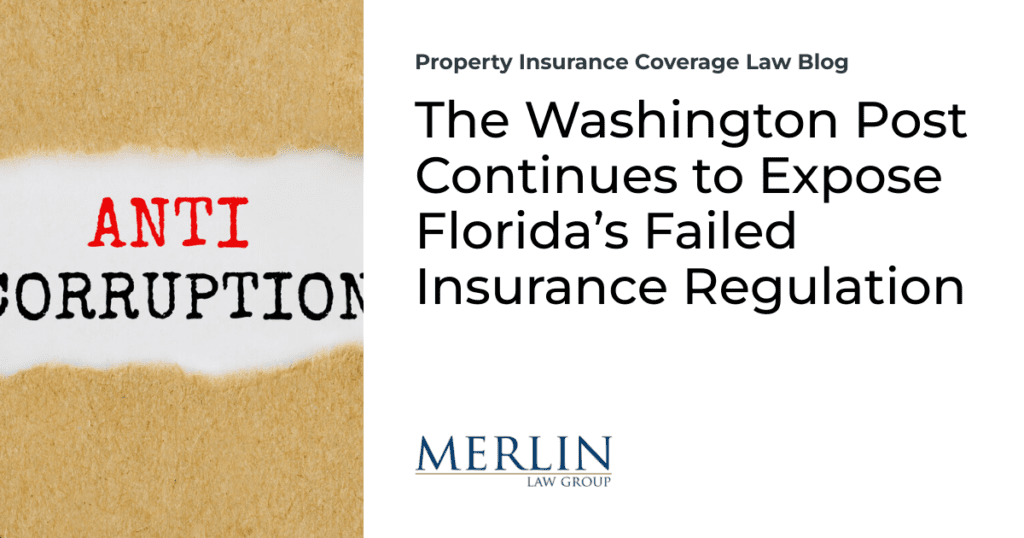The Washington Post Continues to Expose Florida’s Failed Insurance Regulation

The Washington Post investigates government corruption and incompetence. While these investigations are normally at the national level, the Washington Post continues to show how Florida’s insurance regulators are failing Florida’s citizens when it comes to property insurance oversight and protection. Today’s article, How Florida Let a Top Insurer Abandon Homeowners in Their Time of Greatest Need,1 is a must-read for everybody purchasing insurance in Florida.
The article stated in part:
Michael Yaworsky, Florida’s new insurance commissioner, said that state regulators had been on top of monitoring UPC’s behavior and financials. In an interview, he explained how his office was ‘pretty aggressive when it came to our response to the evolving situation with United and UPC.’
‘We met the moment each time something developed,’ he said of UPC’s struggles.
A big problem, Yaworsky pointed out, is that his office had been limited in what they could do regarding how parent companies act and what they do with their money. He pointed to recent legislation, including the new Insurer Accountability Act, that has given his agency more resources and reach to better govern insurers, though the toughest provisions of the law were stripped from the final version. Officials have now pledged to fully investigate UPC’s conduct and any allegations of bad behavior.
UPC’s business model, insurance and financial experts say, reflects a lax regulatory framework that has made it even harder for Florida residents to get back on their feet after disasters.
‘Insurance companies have been given tremendous amount of leeway in Florida,’ Birny Birnbaum, the director of the Center for Economic Justice and a former insurance regulator said in an interview. ‘Light regulation let these smaller companies come in and cherry pick what they want to cover. When there is no hurricane, they can make a tremendous amount of money. When there is one, executives can walk away without much liability and a lot richer.’
UPC was the insurance company I called out for wrongly denying claims on a systemic basis in Zeroed Out Hurricane Claims and Cheating Claims Practices—Why Are Our Florida Politicians Ignoring These Ongoing Claims Problems and Seemingly Protecting Cheating Insurance Companies. I criticized Florida’s legislators and regulators for not taking action or making laws to protect Floridians from such wrongful conduct. The truth is the majority of Florida’s current legislators passed more laws to protect UPC and other wrongfully acting insurance companies. Yaworksy and Florida’s legislators know that the full extent of the legislation took away policyholder rights and that the so-called Accountability Act is a complete sham made for public relations.
The Washington Post article noted that neither Jimmy Patronis nor the Office of Insurance Regulation did anything about these wrongful actions:
Patronis never responded…The Department of Financial Services, which Patronis oversees, said that it looked into Buvens’s allegations in 2021 but closed the probe due to his ‘lack of cooperation’ for an interview. The adjuster rejected that claim, saying he was living in Texas and couldn’t go to Florida on the proposed dates due to previous commitments, and offered to do a virtual interview. His multiple follow-up emails to the office went unanswered, he said.
‘I simply wanted Jimmy Patronis and the DFS to do their job that they were elected to do,’ Buvens said in an interview. ‘Investigate the executives of this insurance company to prevent them from continuing to prey on the policyholders and property owners in Florida.’
That same month, the American Policyholder Association, a nonprofit watchdog with a consumer protection unit led by a former prosecutor, sent two complaints to regulators alleging that UPC altered claims and told adjusters to ‘zero out’ damage. The complaints were sent to the Office of Insurance Regulation, which regulates carriers, and the Department of Financial Services, which investigates allegations of wrongdoing. The letters, reviewed by The Post, contained depositions, phone interview transcripts, estimates, engineer reports and emails.
For months, officials at the two agencies punted the evidence back and forth, according to the series of emails obtained by The Post spanning from 2021 to right before Ian hit last year. In one part of the exchange, at end of January 2022, a Department of Financial Services investigator confirmed that the agency had received the evidence months ago, but thought the Office of Insurance Regulation should handle it. Five months later, in June, the watchdog checked in. This time, an Office of Insurance Regulation official said the Department of Financial Services should handle it, only to receive a response from the Department of Financial Services that they’d already discussed the situation:
‘If you recall, we spoke several weeks ago about this same referral and it was decided OIR would initially look into the allegations,’ according to the email, which The Post obtained from the policyholder association.
The email exchange went dead. The Office of Insurance Regulation said it did not get involved because it had already been monitoring the company for other reasons.
My hat is off to the work of the American Policyholder Association (APA) for helping expose this fraud against policyholders. The next annual meeting of the APA will be in Dallas on November 1-3.
The Washington Post and reporter Brianna Sacks should be congratulated for their follow-up to their previous article noted in Wanna Make a Bet Whether DeSantis/Patronis Insurance Company Investigation Finds More Corruption Than One Washington Post Reporter Will Find. The Washington Post won that bet.
Thought For A Friday Afternoon
Newspapers that are truly independent, like The Washington Post, can still aggressively investigate anyone or anything with no holds barred.
—Bob Woodward
1 Brianna Sacks. How Florida let a top insurer abandon homeowners in their time of greatest need. Washington Post. Aug. 4, 2023. Available online at: https://www.washingtonpost.com/climate-environment/2023/08/04/how-florida-let-top-insurer-abandon-homeowners-their-time-greatest-need/ (last viewed August 4, 2023).



